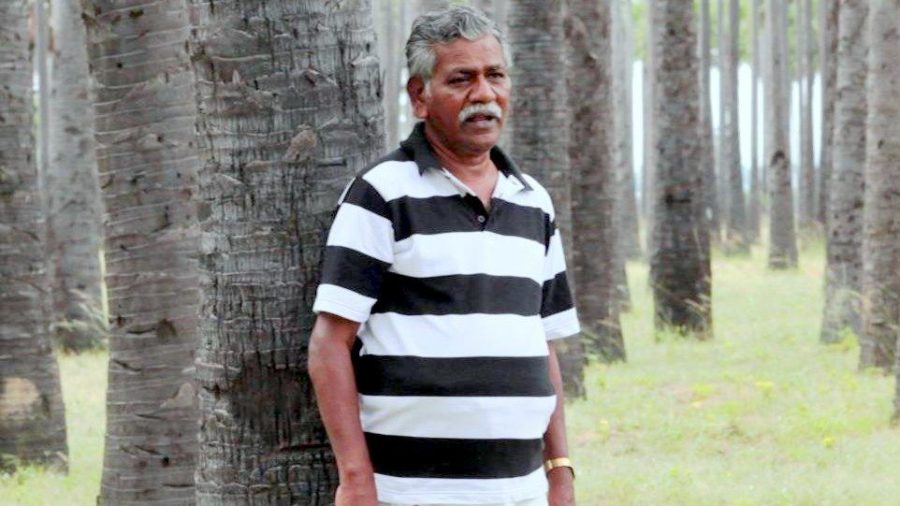Tho Paramasivan, the eminent Tamil writer, cultural historian, and anthropologist, died at his home town in Palayamthottai in Tirunelveli on Thursday. He was 71.
Lena Kumar, who heads Yaathumagi publications which has published many of Tho Pa’s books, said that the late writer had struggled during his last hours after two hospitals refused to admit him.
Kumar said, “On Thursday, at around 4 pm, he suffered from breathing problems and suffocation. His son Masanamani rushed him to the Galaxy private hospital in Wannarapettai, which is around 4 kilometres from their house. The hospital personnel consulted him on the verandah and detected a lung problem. However, they refused to admit him and said they did not have ventilators. After half an hour, his family took him to the Rosemary Mission Hospital.”
Kumar said that the second hospital also refused to let him in due to pandemic-related fears, even though his family asked for first aid attendance. “It is such a tragedy that an eminent scholar like him had to go through this,” Kumar said.
Masanamani then took him to the Tirunelveli Government Hospital, which took him in and put him on ventilator support. The hospital diagnosed him with a lung infection. “His pulse rate was very low, it came down to 57,” Kumar said.
Tho Paramasivan breathed his last at around 7 pm after fighting for three hours.
Kumar said, “I have known him for 20 years, and I have published several of his books. I wanted to deliver his thoughts to the people. He is not just a Tamil scholar. He had great knowledge of many subjects. He had exceptional researching skills and his students are doing salient work.”
Formerly a professor at Manonmaniam Sundaranar University and Yadava College in Madurai, Tho Paramasivan was affectionately known as ‘Tho Pa’. He was a staunch Periyarist and the author of several books that focused on Tamil society and culture, including folklore. This included Alagar Kovil, which was initially his PhD thesis with temple research from the 1970s.
According to a report by The Federal, “Until Paramasivan’s arrival into the field of temple research, many wrote about the architectural beauty and rituals of temples. But it was Paramasivan, who tried to establish a relationship between temples and people.”
A graduate from Alagappa University in Karaikudi, Tho Pa completed his PhD from Madurai Kamaraj University (MKU). J Balasubramaniam, a faculty member at MKU who knew Tho Pa from his student days, told Silverscreen India, said, “While everyone else used literary evidence and sourced references, he followed observational methods and used architecture and ethnography to approach the study.”
Calling the research undertaken by Paramasivan a “pioneering study,” Balasubramaniam said, “He had interpreted culturally every aspect of the temple. With a Tamil language discipline as his background, he took other disciplines like sociology, ethnography, to work on his research. He observed the temple’s rituals, festivals, functions and interpreted them. Though the process is common now, it was a new thing that he did during his time.”
He said, “At the time when researchers used only written evidences as authentic ones, he considered oral and visual evidences like rituals, architecture, as his source of evidence.”
Mentioning one such instance, Balasubramaniam said, “During his research, he observed the shape of altars in temples that were thought to be Vaishnavite or Shaivite. But he deduced it to be a Buddhist temple after observing the shape of the altar.”
He added, “Alagar Kovil was later published in the MKU publication section and was reprinted just ten days back. I am glad that he could see the reprinted book during his last days.”
Recommended
Another important book was Ariyappadaatha Tamilagam (1997). According to The Federal report, “At a time when research on ‘material culture’ is still in its nascent stages in Tamil Nadu, Paramasivan’s book Ariyappadaatha Tamilagam provides detailed information on lost objects such as ural (a mortar which powders rice and wheat), ulakkai (a long rice pounder) as well as food and clothes used by Tamils in the past.”
Balasubramaniam said, “Kamal Hassan was impressed with his book with Panpattu Asaivukal and has consulted with him for a few films to verify historical facts.”
Haasan recently mentioned Alagar Kovil in his ongoing reality show Big Boss (Season 4). Hassan recommended the book to viewers, in an effort to promote a reading habit among them.
Following news of Tho Pa’s death, Kamal Hassan wrote on Twitter, “I am looking forward with eagerness for another person like Tho Paramasivan in making. This tragedy cannot be contained within a tweet.”
தொ.பரமசிவன் மறைந்தார். வருந்துகிறேன். இன்னொரு தொ.பரமசிவன் உருவாக வேண்டும் என்று ஆவலாக காத்திருக்கிறேன்.
இது ட்வீட்டில் அடங்காத் துயரம். pic.twitter.com/mvc5rY9EeW— Kamal Haasan (@ikamalhaasan) December 24, 2020
For Tho Pa, his only God were the writings and teachings of the founder of the Dravidian movement in Tamil Nadu, Periyar EV Ramasamy Naicker. Tho Pa criticised the Dravida Munnetra Kazhagam (DMK) for diluting the Dravidian movement. In 2015, he said in an interview (first published on post.com, cited here):
“Periyar was against caste. The Dravidian movement was against caste. Anna (former Chief Minister Annadurai) compromised the Dravidian movement when he said – “ondrey kulam, oruvaney devan” (One humanity, one God). Karunanidhi [former DMK chief] diluted it further and turned it entirely into votebank politics.”
Following news of his death, DMK chief MK Stalin remarked that Tho Pa died the same day as Periyar.
Stalin said, “He has highlighted the political, social and cultural influences of the Tamil culture and the Dravidian movement.”
தந்தை பெரியார் நினைவு நாளில் தமிழர்களின் பண்பாடு, நாட்டார் வழக்காற்றியல், திராவிட இயக்கம் ஏற்படுத்தியுள்ள அரசியல் – சமூக – பண்பாட்டுத் தாக்கங்களை மிகச் சிறப்பாக எடுத்துரைத்த ஆய்வறிஞர் தொ.பரமசிவன் மறைவெய்தியுள்ளார். ஆழ்ந்த இரங்கல்!
இழப்பில் வாடும் அனைவருக்கும் ஆறுதல் உரித்தாகுக. pic.twitter.com/6vsjqMD6L0
— M.K.Stalin (@mkstalin) December 25, 2020
Paramasivan is survived by a wife and two children.



